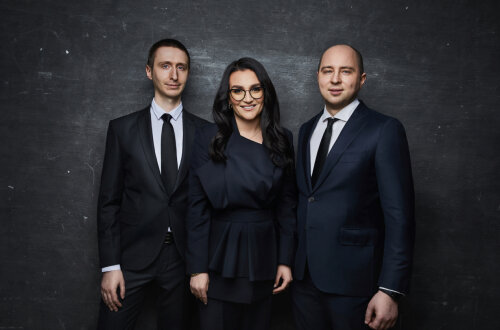Best Guardianship Lawyers in Republic of Lithuania
Share your needs with us, get contacted by law firms.
Free. Takes 2 min.
Or refine your search by selecting a city:
List of the best lawyers in Republic of Lithuania
About Guardianship Law in Republic of Lithuania:
Guardianship in the Republic of Lithuania is a legal relationship where an appointed guardian is responsible for making personal, financial, and medical decisions on behalf of a person who is unable to make these decisions for themselves. This relationship is established to protect the well-being and interests of individuals who are deemed incapacitated or vulnerable.
Why You May Need a Lawyer:
You may need a lawyer for Guardianship in Lithuania in situations such as establishing a guardianship, contesting a guardianship decision, managing the affairs of a minor or incapacitated person, dealing with disputes among family members, or navigating complex legal procedures related to guardianship.
Local Laws Overview:
In Lithuania, the legal framework for guardianship is primarily governed by the Civil Code and the Law on Guardianship and Custodianship. These laws outline the rights and responsibilities of guardians, the process for appointing a guardian, the duties of the guardian, and the rights of the incapacitated person. It is important to consult with a lawyer familiar with Lithuanian guardianship laws to ensure compliance and protection of the rights of all parties involved.
Frequently Asked Questions:
1. What is the difference between guardianship and custody in Lithuania?
In Lithuania, guardianship is typically for individuals who are incapacitated or unable to make decisions for themselves, while custody is usually for the care and upbringing of minors.
2. How is a guardian appointed in Lithuania?
A guardian is typically appointed by a court based on the recommendation of social services or other relevant authorities.
3. What are the duties of a guardian in Lithuania?
The duties of a guardian in Lithuania may include managing the finances of the incapacitated person, making medical decisions on their behalf, and ensuring their overall well-being and safety.
4. Can a guardianship decision be contested in Lithuania?
Yes, a guardianship decision can be contested in court if there are valid reasons for doing so, such as concerns about the competency of the appointed guardian or the well-being of the incapacitated person.
5. How long does a guardianship last in Lithuania?
A guardianship in Lithuania is typically ongoing until the incapacitated person is deemed capable of making decisions for themselves or until a court decides otherwise.
6. Can a guardian be removed in Lithuania?
Yes, a court has the authority to remove a guardian if they are found to be unfit or negligent in their duties.
7. Are there alternatives to guardianship in Lithuania?
Yes, alternatives to guardianship in Lithuania may include limited guardianship, where only specific decisions are delegated to the guardian, or supported decision-making arrangements.
8. How can I find a lawyer for guardianship in Lithuania?
You can find a lawyer for guardianship in Lithuania through legal directories, recommendations from colleagues or friends, or by contacting the Lithuanian Bar Association for referrals.
9. What are the costs associated with hiring a lawyer for guardianship in Lithuania?
The costs of hiring a lawyer for guardianship in Lithuania may vary depending on the complexity of the case, the experience of the lawyer, and the specific legal services required. It is advisable to discuss fees and payment arrangements with the lawyer in advance.
10. Can I represent myself in a guardianship case in Lithuania?
While you have the right to represent yourself in a guardianship case in Lithuania, it is advisable to seek legal counsel to ensure that your rights are protected and that you navigate the legal process effectively.
Additional Resources:
For more information on guardianship in Lithuania, you can contact the Ministry of Social Security and Labour or the Lithuanian Association of Guardians and Custodians.
Next Steps:
If you require legal assistance with guardianship in Lithuania, it is recommended to consult with a qualified lawyer who specializes in this area of law. A lawyer can provide guidance on the legal process, represent your interests in court, and help ensure that your rights and the rights of the incapacitated person are protected.
Lawzana helps you find the best lawyers and law firms in Republic of Lithuania through a curated and pre-screened list of qualified legal professionals. Our platform offers rankings and detailed profiles of attorneys and law firms, allowing you to compare based on practice areas, including Guardianship, experience, and client feedback.
Each profile includes a description of the firm's areas of practice, client reviews, team members and partners, year of establishment, spoken languages, office locations, contact information, social media presence, and any published articles or resources. Most firms on our platform speak English and are experienced in both local and international legal matters.
Get a quote from top-rated law firms in Republic of Lithuania — quickly, securely, and without unnecessary hassle.
Disclaimer:
The information provided on this page is for general informational purposes only and does not constitute legal advice. While we strive to ensure the accuracy and relevance of the content, legal information may change over time, and interpretations of the law can vary. You should always consult with a qualified legal professional for advice specific to your situation.
We disclaim all liability for actions taken or not taken based on the content of this page. If you believe any information is incorrect or outdated, please contact us, and we will review and update it where appropriate.
Browse guardianship law firms by city in Republic of Lithuania
Refine your search by selecting a city.















